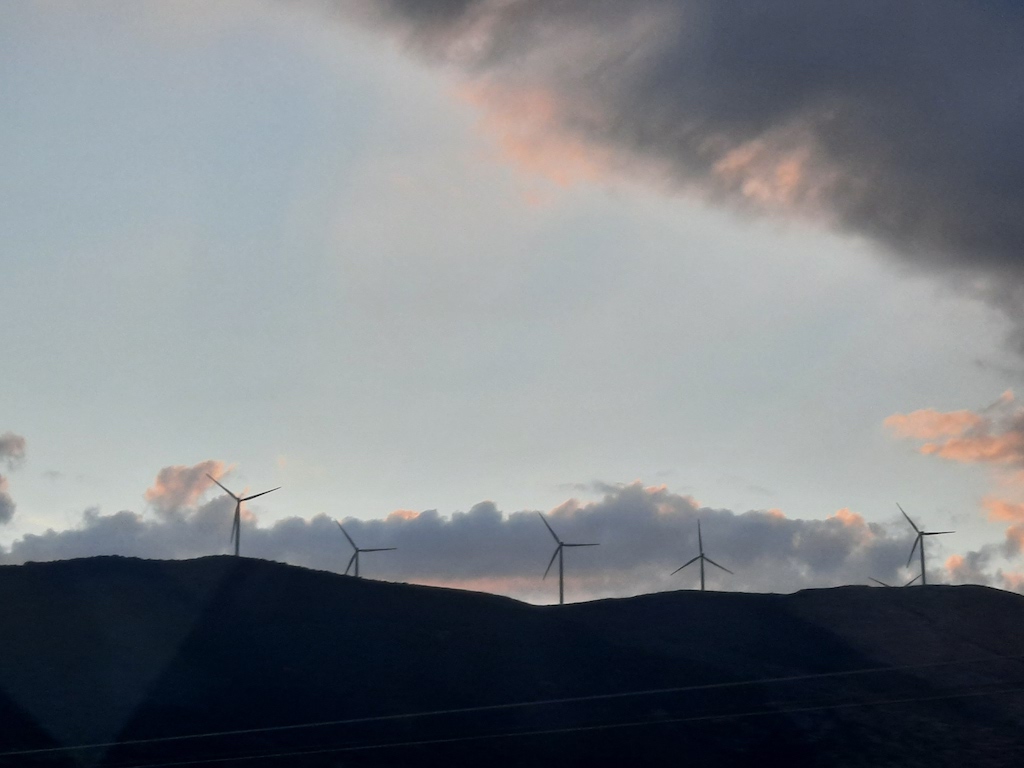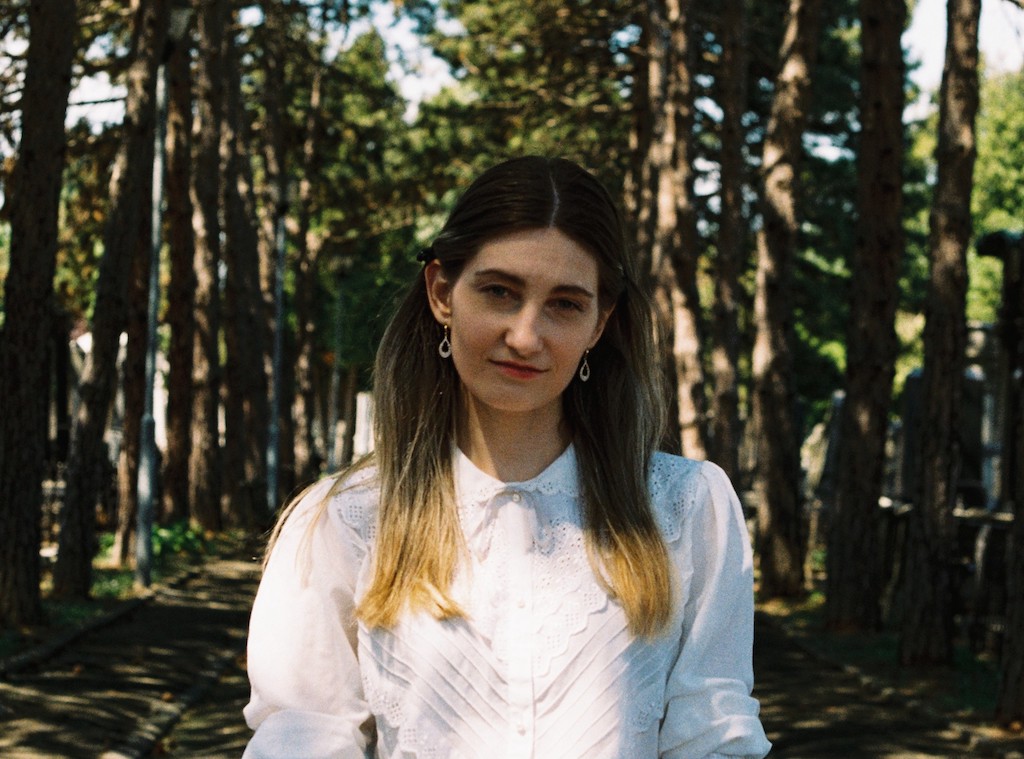Borba protiv vjetrenjača
Na putu do Peloponeza, prolazimo kroz centralnu Grčku. Ovaj je predio jedan od najsiromašnijih dijelova Grčke. Oskudica se ne vidi na planinama i na drveću. Izostankom ljudske brige, prirodni fenomeni ne postaju osiromašeni. Oni ne ovise o našoj ljubavi. Zapušteni, pak, ljudski tragovi, uvijek su jednako tužni. Derutne kuće, ni lijepe ni ružne, mogle su biti i zapušteni secesijski dvorci ili uništeni jugoslavenski spomenici koje sam viđala u Hrvatskoj. Ono što na njima upada u oči nije koliko su koštale kad ih se gradilo, nego koliko se malo pažnje u njih uložilo u desetljećima koja su uslijedila.
Ljudi čuvaju ono što smatraju korisnim. I u Hrvatskoj, i u Grčkoj, malo tko mari za mjesta od čije se obnove ili očuvanja ne može profitirati.
*
Kad se udaljimo od sivo-bijelih kuća, zađemo u šumu. Nestane svaki trag ljudske prošlosti i načina na koje se ona otjelovila u sadašnjosti. Ove planine ipak imaju važnu povijest. Svaki opresivni režim koji se rušio u Grčkoj, rušio se sa planina. „Ήρωες, άπαρτα βουνά / Ήρωες, με δώδεκα ζωές“. Heroji, nepropusne planine. Heroji s dvanaest života. Svaka planina ima svog heroja koji je svojedobno oslobodio seljane od nekog okupatora. Uglavnom su njihove fotografije i dalje na zidovima i u obiteljskim albumima. Kipovi tih ljudi nastanjuju sela i raskrižja. Na planini kraj ceste vidjeli smo nekoliko takvih kipova. A sreli smo i heroja svakodnevnog života – pastira i njegovo krdo koza.
Pastir, odjeven kao bilo koji pastir i koze kao bilo koje koze. Običan život nepokoren promjenama ekonomskih i političkih sustava.
*
Nekoliko kilometara dalje zatiče nas neobičan prizor: drveća nestane, a pojave se goleme vjetrenjače. Hektari su šume ovdje izgorjeli. Jedni tvrde da je šuma namjerno zapaljena kako bi se napravilo prostora za vjetrenjače, dok drugi smatraju da je priča o namjernim izazivanjima požara teorija zavjere. Činjenica jest da se u posljednjih nekoliko godina ovaj proces na isti način odvija na različitim lokacijama u Grčkoj, a slični požari, nakon kojeg se grade stambeni objekti, događaju se i u Hrvatskoj.
Kad pomislim da postoji mogućnost da je netko spalio šumu iznad nečijeg sela u ime održivog razvoja, prožme me jeza. Nepokorive planine, simbole otpora, pokorila je ljudska pohlepa.
*
Vjetrenjače same po sebi nisu ni dobre ni zle. Bijelo mehaničko drveće, veličine prapovijesnih stabala, neutralno lebdi, kao goleme tratinčice iscvjetale iz rozog neba. U vidokrugu nigdje nema ničega osim jednoličnih, odmjerenih okretaja.
Prizor je impresivan i, kad ne bih znala njegovu povijest, veselio bi me kao lijep primjer suživota prirode i čovjeka, starog i novog.
Ovako se proteže preda mnom kao nadmoćni podsjetnik na poraz čovjeka pred samim sobom.
Vrsta smo koja još nije naučila: nemoguće je profitirati od uništenja.
Der Kampf gegen Windmühlen
Auf dem Weg auf die Peloponnes fahren wir durch Zentralgriechenland. Es ist eine der ärmsten Gegenden des Landes. Der Mangel ist den Bergen und den Bäumen nicht anzusehen. Auch wenn die Menschen sich um sie nicht kümmern, verarmen die Naturphänomene nicht. Sie sind nicht von unserer Liebe abhängig. Die menschlichen Spuren dagegen wirken immer traurig, wenn sie vernachlässigt sind. Baufällige Häuser, weder hübsch noch hässlich, es könnten auch die verlassenen Jugendstil-Schlösser oder die zerstörten jugoslawischen Denkmäler sein, die ich in Kroatien gesehen habe. Das, was augenfällig ist, ist nicht der ursprüngliche Wert eines Gebäudes, sondern die fehlende Aufmerksamkeit und Pflege in den darauffolgenden Jahrzehnten.
Die Menschen halten jene Objekte instand, die sie für nützlich halten. Sowohl in Kroatien wie auch in Griechenland kümmert sich kaum jemand um Orte, deren Erhaltung oder Erneuerung nicht besonders profitabel erscheinen.
*
Wenn wir uns von den grau-weißen Häusern entfernen, betreten wir den Wald. Jede Spur menschlicher Vergangenheit und ihrer Verkörperung in der Gegenwart ist verschwunden. Diese Berge blicken jedoch auf eine bedeutende Vergangenheit zurück. Von den Bergen gingen alle Umstürze der oppressiven griechischen Regime aus. Ήρωες, άπαρτα βουνά / Ήρωες, με δώδεκα ζωές. Helden, die undurchlässigen Berge. Helden, mit zwölf Leben. Jeder Berg hat seinen eigenen Helden, der seinerzeit die Bauern von irgendeinem Besatzer befreit hat. Ihre Fotos werden noch immer an den Wänden und in den Familienalben verwahrt. In den Dörfern und an den Wegkreuzungen stehen Statuen, die ihnen zu Ehren errichtet wurden. Am Wegesrand sehen wir einige dieser Skulpturen. Und wir begegnen auch einem Helden des Alltags in den Bergen – einem Hirten und seiner Ziegenherde.
Ein Hirte, gekleidet wie jeder Hirte, und seine ganz gewöhnlichen Ziegen. Ein gewöhnliches Leben, das von den Veränderungen der wirtschaftlichen und politischen Systeme unberührt geblieben ist.
*
Einige Kilometer weiter erwartet uns eine ungewöhnliche Szenerie: die Bäume sind verschwunden und riesengroße Windmühlen tauchen auf. Hier sind viele Hektar Wald abgebrannt. Es gibt Menschen, die behaupten, dass der Wald absichtlich in Brand gesetzt wurde, damit Raum für die Windmühlen entstehen konnte, während andere glauben, dass diese Geschichte eine reine Verschwörungstheorie sei. Doch in den letzten Jahren hat es an verschiedenen Orten in Griechenland ähnliche Vorkommnisse gegeben. Ähnliches geschah auch in Kroatien, es gab dort ähnliche Waldbrände, nach denen der Wald zum Baugebiet wurde.
Bei dem Gedanken daran, dass irgendjemand womöglich im Namen einer nachhaltigen wirtschaftlichen Entwicklung den Wald oberhalb eines Dorfes in Brand gesetzt hat, bekomme ich eine Gänsehaut. Die unbezähmbaren Berge, diese Symbole des Widerstands, unterlagen der menschlichen Gier.
*
Die Windmühlen sind an sich weder gut noch böse. Die weißen mechanischen Bäume, groß wie urzeitliche Bäume, schweben völlig unbeteiligt in der Luft, riesigen Gänseblümchen ähnlich, die an einem rosaroten Himmel blühen. Weit und breit nichts außer ihrem eintönigen, gleichmäßigen Drehen.
Es ist ein beeindruckender Anblick, und würde ich seine Vorgeschichte nicht kennen, würde ich mich freuen über dieses schöne Beispiel eines Miteinanders von Natur und Mensch, von Altem und Neuem. Doch ich kann nicht umhin, es als eine mächtige Mahnung zu sehen, als Symbolbild der Niederlage des Menschen vor sich selbst. Wir Menschen sind eine Spezies, die noch nicht begriffen hat, dass es unmöglich ist, von Zerstörung zu profitieren.
Übersetzung: Alida Bremer
Fighting Windmills
On our way to the Peloponnese, we pass through central Greece. This is one of the poorest parts of the country. This poverty cannot be seen in the mountains and the trees. Human neglect does not impoverish natural phenomena. They don’t depend on our love. But the neglected remains of humanity, however, always look equally sad. These dilapidated houses, neither beautiful or ugly, could be the neglected Art Nouveau palaces or destroyed Yugoslav monuments that I have seen in Croatia. What is particularly evident is not the cost of their construction, but the price of the decades of a lack of their maintenance.
People take care of what they find useful. In Croatia, and Greece, few care for the places whose restoration or maintenance does not bring profit.
*
As we move away from the grey-white houses, we enter a forest. Every trace of human past disappears and the ways this past manifests itself in the present. These mountains have their own important history. Every oppressive regime that was brought down in Greece, was brought down in the mountains. „Ήρωες, άπαρτα βουνά / Ήρωες, με δώδεκα ζωές„ Heroes, indomitable mountains. Heroes with twelve lives. Each mountain has its own hero who had, at some point, liberated the peasants from a particular invader. Their photographs still hang on many walls and rest in family albums. Their statues inhabit villages and crossroads. We saw several such statues in the mountains, on the roadside. And we also come across a real life, everyday hero – a goatherd and his flock.
He is dressed like any other goatherd and his goats are like any other goats. An ordinary life, resistant to the changes of economic and political systems.
*
Several kilometres later we see an unusual scene: the trees disappear, and enormous windmills stand before us. Hectares of forest have been burned down here. Some claim that the forest fire was deliberate so that the windmills could be erected, and others claim that the idea of deliberate forest fires is a conspiracy theory. The fact is that in several years this same sequence of events has taken place in various locations across Greece, and similar fires, after which apartment blocks are constructed, also happen in Croatia.
When I think of the possibility that someone might set a forest fire above a village in the name of sustainable energy, I am horrified. The indomitable mountains, a symbol of resistance, have been crushed by human greed.
*
The windmills are not inherently good or evil. White mechanical trees, the size of ancient trees, they float neutrally, like enormous daisies blooming out of a pink sky. There is nothing on the horizon apart from their monotonous, measured revolutions.
The scene is impressive and, if I didn’t know its history, it would make for a satisfying sight of a harmonious coexistence of humanity and nature, of old and new.
As it is, the sight spreads before me as a powerful reminder of the way humanity has crushed itself.
We are a species that has not yet learned this lesson: it is impossible to profit from destruction.
Translation: Vesna Maric
Teilen












